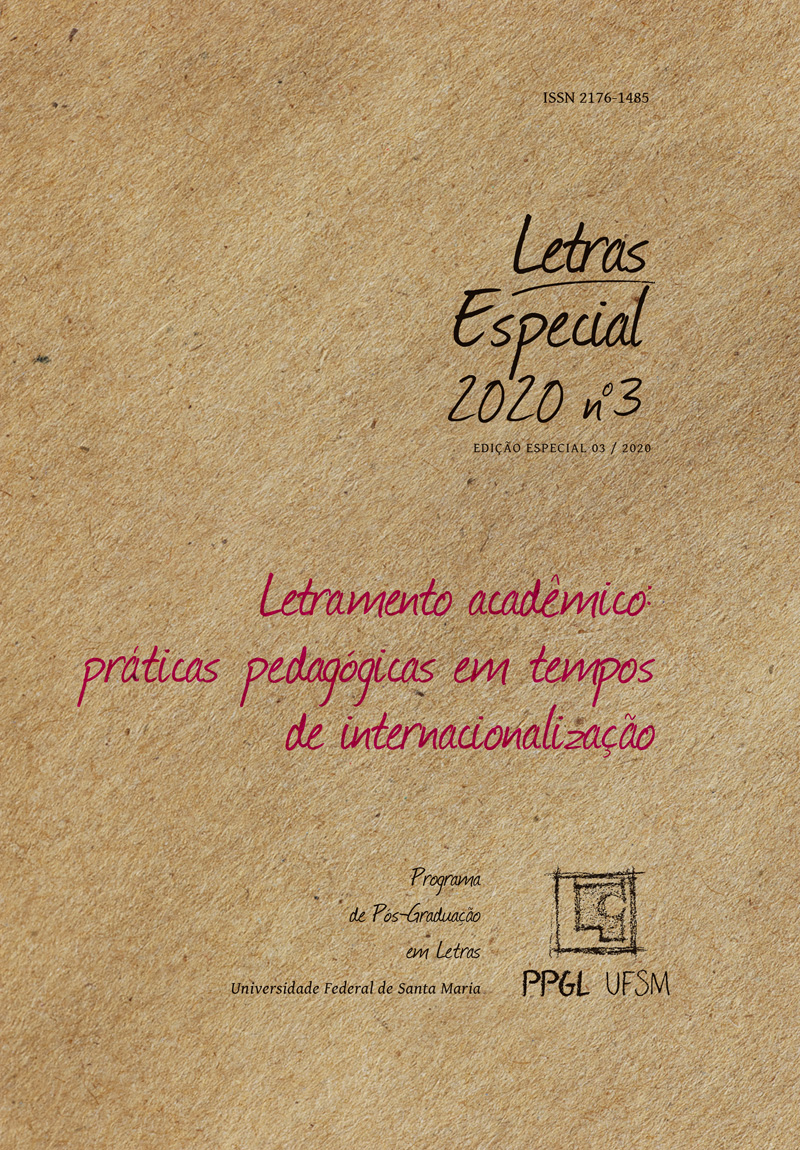The design of a blended learning course to develop conference presentation skills for postgraduate students in medicine
DOI :
https://doi.org/10.5902/2176148544489Mots-clés :
Academic literacies, Blended learning, Conference presentation skills, Pronunciation teaching, English as a Lingua FrancaRésumé
The predominance of English as a scientific lingua franca and the pressure to raise the international ranking of Brazilian universities have increased the demand for support in developing a range of academic literacies in English, for example in areas such as presenting one’s research at international conferences. The challenges to delivering targeted support for the development of such literacies include limited space in the curriculum, negotiating regular meeting times for busy students and instructors, and the fact that large institutions often have geographically dispersed campuses. Blended learning offers a possible means of addressing these challenges in the flexibility afforded by course delivery that is partly face-to-face and partly online and asynchronous. This paper reports on the design, delivery and evaluation of two editions of a course in conference presentation skills, delivered to postgraduate students in the Faculty of Medicine at the University of Sao Paulo in 2018-19. The paper discusses the affordances, limitations and continuing challenges of blended learning in support of academic literacies designed to enhance medical students’ presentational skills in English.
Téléchargements
Références
BASTALICH, W.; BEHREND, M.; BLOOMFIELD, R. Is non-subject based research training a ‘waste of time’, good only for the development of professional skills? An academic literacies perspective. Teaching in Higher Education, v. 19, n. 4, p. 373-384, 2014. DOI: https://doi.org/10.1080/13562517.2013.860106
BAUMVOL, L. K. Language practices for knowledge production and dissemination: the case of Brazil. Tese (Doutorado em Letras) Instituto de Letras, Universidade Federal do Rio Grande do Sul. Porto Alegre-RS, 2018.
BLOME, C.; SONDERMANN H.; AUGUSTIN M. Accepted standards on how to give a Medical research presentation: a systematic review of expert opinion papers. GMS J Med Educ. v. 34, n. 1, Doc11, 2017. Available at: https://www.egms.de/static/en/journals/zma/2017-34/zma001088.shtml. Accessed on: 13March 2021.
CORBETT, J. Genre and genre analysis. In: BROWN, E. K.; ANDERSON, A. (Eds.). Encyclopedia of Language and Linguistics. 2. ed. Vol. 5. London, Amsterdam, New York: Elsevier, 2006, p. 26-32. DOI: https://doi.org/10.1016/B0-08-044854-2/00514-9
FERREIRA, M. M.; LOUSADA, E. G. Ações do laboratório de letramento acadêmico da Universidade de São Paulo: promovendo a escrita acadêmica na graduação e na pós-graduação. Ilha do Desterro, v. 69, n. 3, p. 125-140, 2016. DOI: https://doi.org/10.5007/2175-8026.2016v69n3p125
FERREIRA, M.M.; LOUSADA, E.G. (Eds.). Pesquisas sobre letramento em contexto universitário: a produção do Laboratório de Letramento Acadêmico (LLAC) da USP. São Paulo: Humanitas, Forthcoming.FERREIRA, M.M.; STELLA, V.C.R. (Eds.). Redação acadêmica: múltiplos olhares para o ensino da escrita acadêmica em português e línguas estrangeiras. São Paulo: Humanitas, 2018.
FINARDI, K.; ROJO, R. Globalization, internationalization and education: what is the connection? International E-Journal of Advances in Education, v. 1, n. 1, p. 18-25, 2015. DOI: https://doi.org/10.18768/ijaedu.16488
GODOY, S.M.B.; GONTOW, C.; MARCELINO, M. English pronunciation for Brazilians: the sounds of American English. Barueri: Editora DISAL, 2006.
HELLER III, R. E.; SILVA III, E. Preparing and delivering your best radiology lecture. Journal of the American College of Radiology, v. 16, n. 5, p. 745-748, 2019. DOI: https://doi.org/10.1016/j.jacr.2018.10.030
HYLAND, K. Disciplinary discourses: social interactions in academic writing. Ann Arbor: University of Michigan Press, 2004.
HYON, S. Introducing genre and English for Specific Purposes. London: Routledge, 2017. JENKINS, J. The phonology of English as an international lan-guage. Oxford: Oxford University Press, 2000. DOI: https://doi.org/10.4324/9781315761152-1
JORDÃO, C.M. Decolonizing identities: English for internationalization in a Brazilian university. Interfaces Brasil/Canadá, v. 16, n. 1, p. 191-209, 2016.
MEYERS, C. The ‘Mirroring Project’: a contextualized and integrated approach to pronunciation teaching. Center for Advanced Research on Second Language Acquisition, University of Minnesota, 2016. Available from: https://www.youtube.com/watch?v=g0TUFKNsRGw. Accessed on: 13 March 2021.
NORTH, B., GOODIER, T. & PICCARDO, E. Common European Framework of Reference for languages: learning, teaching, assessment: Companion Volume with New Descriptors. Strasbourg: Council of Europe, 2018. Available from: http://www.coe.int/lang-cefr. Accessed on: 13 March 2021.
NWOGU, K. N. The medical research paper: Structure and functions. English for Specific Purposes, v. 16, n. 2, p. 119-138, 1997. DOI: https://doi.org/10.1016/S0889-4906(97)85388-4
SAGEL, S.; RAMSEY, R. G. Effective audiovisual presentation. American Journal of Roentgenology, v. 156, n. 1, p. 181-187, 1991. DOI: https://doi.org/10.2214/ajr.156.1.1701610
SWALES, J. M. Genre analysis: English in academic and research settings. Cambridge: Cambridge University Press, 1990.
SWALES, J. M. Research genres: Explorations and applications. Cambridge University Press, 2004. DOI: https://doi.org/10.1017/CBO9781139524827
TARONE, E.; MEYERS, C. The Mirroring Project: Improving supraseg-mentals and intelligibility in ESL presentations. In: ALONSO, R. A. (Ed.). Speaking in a second language. Amsterdam/Philadelphia: John Benjamins, 2018, p. 197-224. DOI: https://doi.org/10.1075/aals.17.09tar
VAUGHAN, N.D.; CLEVELAND-INNES, M.; GARRISON, D.R. Teaching in blended learning environments: creating and sustaining communities of inquiry. Edmonton: Athabasca University Press, 2013.
WELLSTEAD, G.; WHITEHURST, K.; GUNDOGAN, B.; AGHA, R. How to deliver an oral presentation. International Journal of Surgery Oncology. v. 2, e25, p. 1-2, 2017. DOI: https://doi.org/10.1097/IJ9.0000000000000025
ZHANG, R. Exploring blended learning experiences through the community of inquiry framework. Language Learning & Techno-logy, v. 24, n. 1, p. 38-53, 2020.
Téléchargements
Publié-e
Versions
- 2022-08-02 (4)
- 2022-07-26 (3)
- 2022-07-04 (2)
- 2021-10-19 (1)
Comment citer
Numéro
Rubrique
Licence
(c) Tous droits réservés Letras 2021

Cette œuvre est sous licence Creative Commons Attribution - Pas d'Utilisation Commerciale - Partage dans les Mêmes Conditions 4.0 International.
Ficam concedidos a Letras todos os direitos autorais referentes aos trabalhos publicados. Os originais não devem ter sido publicados ou submetidos simultaneamente a outro periódico e não serão devolvidos. Em virtude de aparecerem nesta revista de acesso público, os artigos são de uso gratuito, com atribuições próprias, em aplicações educacionais e não comerciais.






